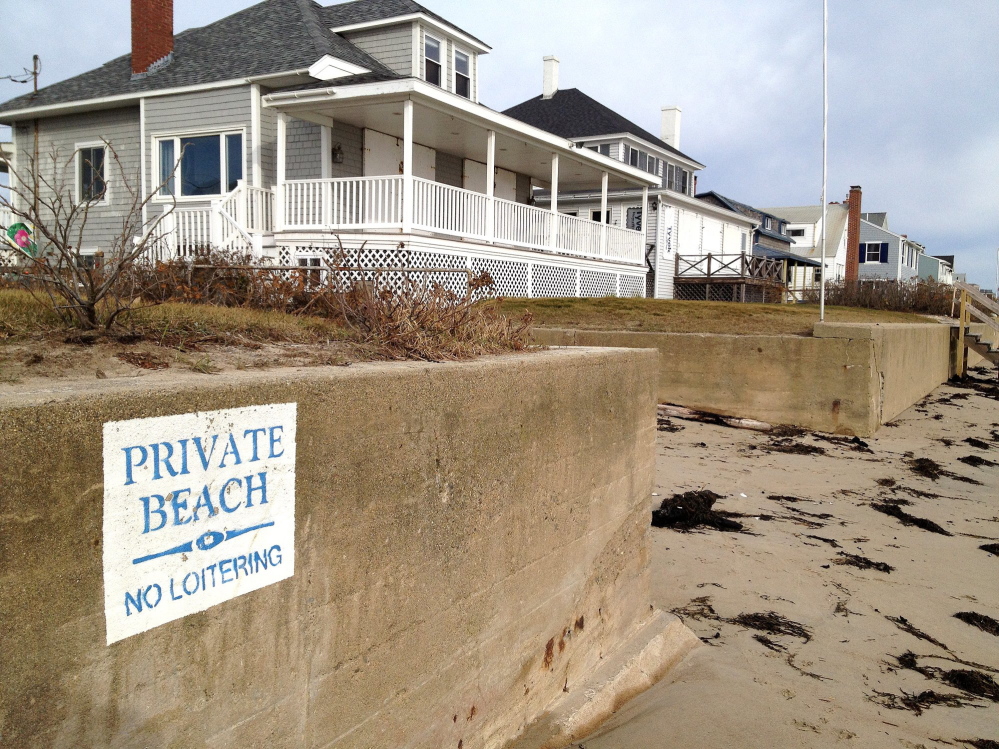KENNEBUNKPORT — Imagine if you were told you could no longer swim, stroll or recreate on your favorite beach in Maine, one that you and others have frequented for generations.
For more than a century, families have come to Goose Rocks Beach in Kennebunkport to enjoy its magnificent splendor. The town has long maintained the beach for all to enjoy – both residents and visitors alike – providing lifeguards and police, cleaning the beach and repairing the seawall.
The recent beach ruling by our state’s Supreme Judicial Court has called into question the public’s right to use Maine’s precious beaches. The town of Kennebunkport recognizes the need to balance the interests of public access and private property rights. That is why it reached an agreement in 2012 with more than half the beachfront owners on Goose Rocks Beach that ensures continued public access while respecting private property rights.
But the law court’s ruling, if it stands, upsets that delicate balance forever, stripping the public of its rights to enjoy Maine’s seashore, and placing the keys to our coastline in the hands of the few who can afford to own shorefront property in Maine.
The attorneys for the plaintiffs – beachfront owners who sued the town claiming the right to exclude all others from Goose Rocks Beach – argue that denying the public’s right to use the beach is actually good for public access. They claim that recognizing any public rights will cause owners to fence off their properties to prevent those rights from being asserted.
This argument holds no water. Maine law has long recognized public prescriptive easements over private land.
In 2000, the law court ruled in Eaton v. Town of Wells that the public could recreate at Wells Beach by way of a prescriptive easement. The evidence in Eaton was significant, including a century of public beach use, combined with town lifeguards and longstanding maintenance of the beach for public use.
If recognition of public recreational rights to a beach would cause private landowners to fence off their lands to public use, as attorneys for the beachfront owners warn, why have we not already seen this in the 14 years since the Wells Beach case was decided?
On the contrary, there has been no backlash, and the result would be no different today if similar public rights were recognized on Goose Rocks Beach. Accordingly, snowmobilers and other recreational users of privately owned woodlands have no reason to be concerned by a public prescriptive easement on Goose Rocks Beach.
But those siding with the beachfront owners at Goose Rocks say that anything other than exclusive private control of our beaches will spell the end for public access to private land in Maine. They claim that private landowners will be encouraged to permit public recreation only if they have the unfettered right to restrict it.
But the experience on another sandy beach in Wells proves otherwise. In 1989, the court in Bell v. Town of Wells ruled that beachfront owners could restrict public access to Moody Beach.
In the 25 years since then, have these beachfront owners encouraged public use at Moody Beach? A sign photographed in 2012 tells it all: “Private Beach, No Loitering.” As a result of that ruling, the public is no longer welcome on Moody Beach.
On April 9, the law court will hear arguments to reconsider its Goose Rocks Beach ruling. At stake is the public’s right to enjoy Maine’s beautiful coastline.
If the ruling is unchanged, it may no longer be possible to establish public recreational rights on any Maine beach, and the exclusion of the public from our shores will become the new norm. Despite beachfront owners’ assurances that they will permit continued public use of Goose Rocks Beach, they are not bound to do so and can change their mind on a whim, as can future owners of their properties.
Is this the right result for a state with an “open lands tradition” whose economy relies on tourism and recreational use of our seashore? Should Maine’s coastline be closed to the public, with the keys to public access left entirely in the hands of private shorefront owners?
In the words of then-Chief Justice Daniel Wathen in his dissent in Bell, “the public’s right even to stroll upon the intertidal lands hangs by the slender thread of the shoreowners’ consent. … In my judgment, the public rights should not be so quickly and completely extinguished.”
In the coming weeks, we hope the law court will agree.
— Special to the Press Herald
Send questions/comments to the editors.



Success. Please wait for the page to reload. If the page does not reload within 5 seconds, please refresh the page.
Enter your email and password to access comments.
Hi, to comment on stories you must . This profile is in addition to your subscription and website login.
Already have a commenting profile? .
Invalid username/password.
Please check your email to confirm and complete your registration.
Only subscribers are eligible to post comments. Please subscribe or login first for digital access. Here’s why.
Use the form below to reset your password. When you've submitted your account email, we will send an email with a reset code.